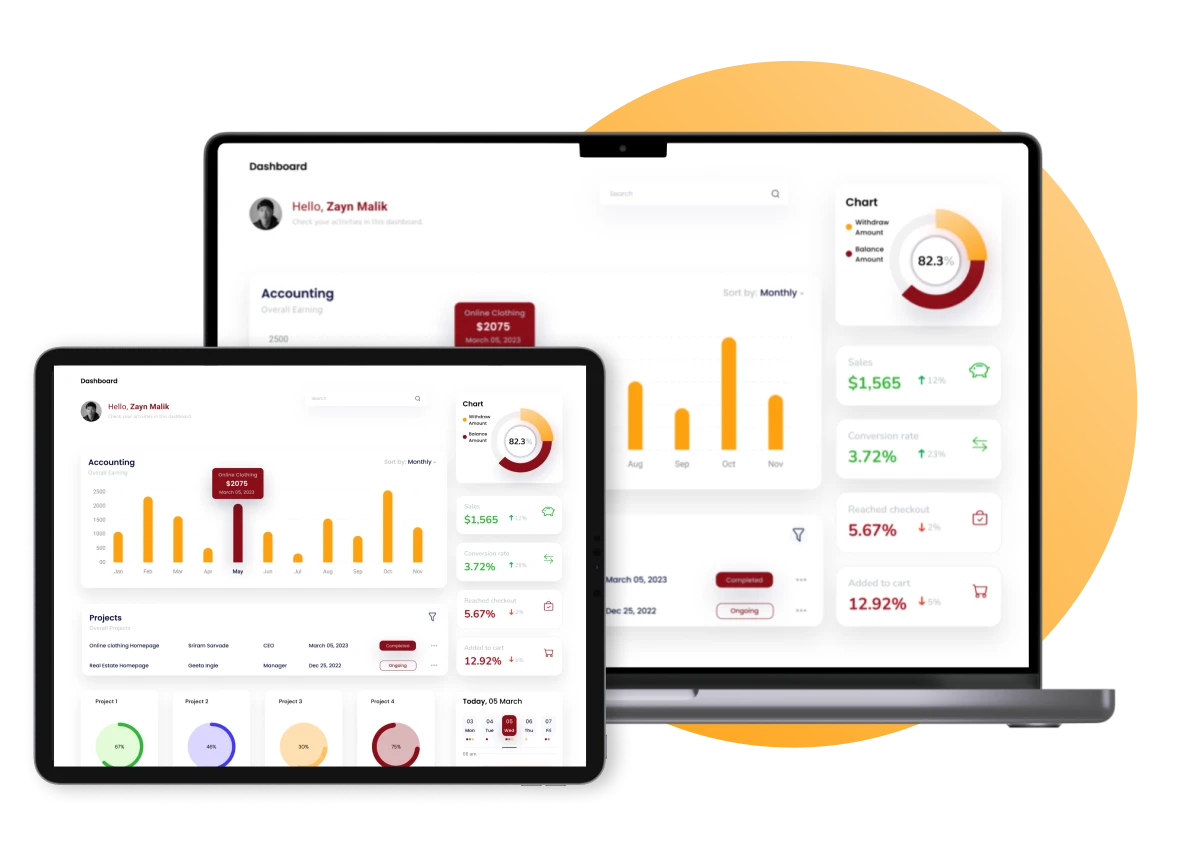In today’s digital age, businesses in Singapore need to stay ahead of the curve to unlock their full potential and achieve remarkable success. Digital transformation is the key to realizing this potential, as it enables businesses to embrace technology innovation, streamline processes, and provide superior customer experiences.
By leveraging digital technologies, such as ERP systems, businesses can elevate their performance, boost efficiency, and stay competitive in an ever-evolving market.
In this article, we will delve into the explanation of digital transformation and how it impacts your business.
Table of Content:
Table of Content
Key Takeaways
|
Table of Content:
Table of Content
What is Digital Transformation?
Digital transformation is the process of leveraging digital technologies to create and modify business processes, culture, and customer experiences. It goes beyond traditional roles and functions, starting from how businesses think about and engage with customers.
Digital transformation plays a crucial role in unlocking a business’s full potential, boosting efficiency, and staying competitive in the digital age. By utilizing digital technologies, businesses can reimagine how they conduct their operations and interact with customers.
It involves the integration of digital tools and strategies to meet changing business and market requirements. Digital transformation is not limited to specific departments or functions; it encompasses every aspect of a business, from sales to marketing to customer service.
“Digital transformation is not just about using technology to improve existing processes. It is about adopting a digital mindset and embracing new ways of doing business. It enables businesses to leverage digital technologies to streamline their processes, improve efficiency, and stay agile and flexible. Digital transformation is the key to unlocking a business’s full potential in the digital era.”
With a digital transformation strategy, businesses can leverage technology to not only enhance their internal processes but also personalize customer experiences. It allows businesses to gather and analyze customer data, enabling them to deliver tailored offerings and improve customer satisfaction.
Digital transformation is an ongoing journey that requires businesses to constantly adapt and innovate to meet the evolving needs of their customers.
In conclusion, digital transformation is more than just adopting new technologies. It is about harnessing the power of digital tools and strategies to transform business processes, culture, and customer experiences.
By embracing digital transformation, businesses can unlock their full potential, improve operational efficiency, and stay competitive in the digital age.
The Importance of Digital Transformation for Business in Singapore
Digital transformation is a critical strategy for businesses in Singapore to stay competitive and unlock their full potential in the digital age. Embracing digital transformation allows businesses to leverage innovative technologies, streamline processes, and enhance customer experiences. It plays a crucial role in developing effective business strategies, adapting to changing market demands, and driving growth.
By embracing a digital adoption strategy, businesses in Singapore can adopt a forward-thinking approach to technology innovation. They can explore and implement new technologies, tools, and methodologies to enhance their business processes and customer interactions. This enables them to stay agile and responsive to market changes, experiment with new ideas, and continuously improve their operations.
“Digital transformation is not just about technology, it is about transforming the way businesses think about and engage with their customers. It is a catalyst for innovation, enabling businesses to reimagine how they operate and deliver value in a rapidly changing business landscape.”
In Singapore’s fast-paced business environment, digital transformation services are vital for businesses to thrive. It provides the foundation for businesses to embrace technology innovation, optimize their operations, and unlock new growth opportunities.
By leveraging digital transformation, businesses can stay ahead of the curve and make data-driven decisions to navigate the digital landscape successfully.
The Impact of Digital Transformation on Business Strategy
Digital transformation reshapes the way businesses formulate their strategies. It allows businesses to gather and analyze vast amounts of data, enabling them to gain valuable insights into customer behavior, market trends, and competitive landscapes.
This data-driven approach empowers businesses to make informed decisions, optimize their offerings, and create personalized experiences for their customers.
Furthermore, digital transformation enables businesses to adapt their strategies quickly and effectively in response to market changes. The ability to stay agile and flexible is crucial in Singapore’s dynamic business ecosystem.
By embracing digital transformation, businesses can seize new opportunities, mitigate risks, and drive innovation to achieve sustainable growth.

The Correlation between Digital Transformation and ERP Systems
Digital transformation is an essential strategy for businesses in Singapore to thrive and stay competitive in the digital age. One crucial aspect of digital transformation is the implementation of Enterprise Resource Planning (ERP) systems.
ERP systems play a significant role in streamlining and integrating various business processes across different departments, enabling businesses to operate more efficiently and effectively.
Also, ERP systems provide businesses with real-time access to critical data, enabling informed decision-making and improved operational efficiency. By leveraging data analytics capabilities within ERP systems, businesses can gain valuable insights into their performance, customer behavior, and market trends. These insights help businesses make data-driven decisions and drive continuous improvement in their operations.
HashMicro ERP System as The Best ERP System in Singapore
In navigating the complexities of the digital landscape, businesses in Singapore must select an ERP system that not only aligns with their operational needs but also propels them toward greater heights of efficiency and productivity.
This is where HashMicro’s ERP system stands out as the premier choice. Renowned for its intuitive design and comprehensive suite of features, HashMicro’s ERP system is crafted to meet the unique demands of Singapore’s dynamic business environment.
What sets HashMicro apart is its unwavering commitment to innovation and customer satisfaction. The system is engineered to be scalable, ensuring that as your business grows, your ERP capabilities can expand in tandem.
Whether it’s refining inventory control, enhancing financial protocols, or simplifying the supply chain, HashMicro’s ERP system is the catalyst for seamless operational flow.
Moreover, with HashMicro’s ERP system, real-time data isn’t just a possibility—it’s a guarantee. Empower your business with the ability to make strategic, informed decisions at a moment’s notice, propelled by cutting-edge data analytics that dissects market trends and customer behavior with precision. With EDG, a company can save money up to 50% and invest in a guaranteed ERP system.
The Role of Technology Innovation in Digital Transformation
Technology innovation plays a crucial role in driving digital transformation for businesses in Singapore. By embracing new technologies, tools, and methodologies, businesses can enhance their processes and customer experiences, staying ahead of the competition.
Technology innovation, combined with an agile methodology, allows businesses to quickly adapt to market changes, experiment with new ideas, and continuously improve their operations.
One of the key aspects of technology innovation in digital transformation strategy is the adoption of cutting-edge digital solutions. From cloud computing to artificial intelligence (AI), businesses can leverage these technologies to streamline operations, make data-driven decisions, and deliver personalized experiences.
Cloud computing provides scalable and cost-effective infrastructure, enabling businesses to store and analyze large amounts of data securely. AI, including machine learning, automates processes, enables predictive analytics, and drives better decision-making.
Furthermore, technology innovation empowers businesses to connect devices and systems, creating a network of interconnected devices known as the Internet of Things (IoT). By leveraging IoT, businesses can gather real-time data from various sources, optimize processes, and deliver personalized experiences to their customers. The IoT revolutionizes the way businesses operate, enhancing productivity, automation, and innovation.
The Benefits of Technology Innovation in Digital Transformation
- Enhanced Efficiency: Technology innovation enables businesses to automate repetitive tasks, streamline processes, and improve operational efficiency.
- Better Decision-Making: By leveraging data analytics and AI, businesses gain valuable insights that drive better decision-making. It allows them to stay agile and make informed strategic choices.
- Improved Customer Experiences: With the use of innovative technologies, businesses can deliver personalized experiences, gather customer data, and provide seamless omnichannel interactions.
- Increased Competitiveness: Technology innovation empowers businesses to stay competitive in the digital landscape by adopting the latest technologies and staying ahead of market trends.
Overall, technology innovation, like virtual assistant, is a critical component of digital business transformation. By embracing new technologies, adopting an agile mindset, and leveraging innovative tools, businesses in Singapore can unlock their full potential, drive growth, and thrive in the digital age.

The Impact of Digital Transformation on Customer Experience
Customer experience is a crucial aspect of business success, and digital transformation plays a significant role in enhancing and revolutionizing it. By leveraging digital technologies, businesses can provide seamless and personalized experiences to their customers, driving customer satisfaction and loyalty.
Data analytics, a key component of digital transformation, empowers businesses to gain valuable insights into customer behavior and preferences, enabling them to better understand and meet customer needs.
One of the key ways digital transformation impacts customer experience is through personalized interactions. By analyzing customer data, businesses can tailor their offerings and communication to individual customers, delivering targeted and relevant experiences. This level of personalization creates a sense of value and connection, fostering stronger customer relationships.
Digital transformation also enables businesses to provide seamless omnichannel experiences. With the proliferation of digital touchpoints, customers expect a consistent and integrated experience across various channels.
By leveraging digital technologies, businesses can ensure a unified brand experience, allowing customers to effortlessly transition between online and offline channels.
Data analytics, another important aspect of digital transformation, helps businesses gain deeper insights into customer preferences and behaviors. By analyzing customer data, businesses can uncover patterns and trends, enabling them to make data-driven decisions to improve their products, services, and overall customer experience.
Data analytics also allows businesses to identify areas for improvement and optimize their operations. It ensures a seamless and efficient customer journey.

The Role of Cloud Computing and Artificial Intelligence in Digital Transformation
In today’s fast-paced digital landscape, cloud computing and artificial intelligence (AI) are crucial in driving successful digital business transformation in Singapore. Cloud computing provides businesses with scalable and cost-effective infrastructure to support their digital transformation initiatives.
With cloud computing, businesses can securely access and store large amounts of data, collaborate remotely, and leverage a wide range of cloud-based applications and services.
Artificial intelligence, including machine learning, is another essential component of digital business transformation. AI technologies enable businesses to automate processes, make accurate predictions, and improve decision-making.
By leveraging AI, businesses can analyze vast amounts of data in real-time, identify patterns and trends, and gain valuable insights into customer behavior, market trends, and operational efficiency.
The combination of cloud computing and AI empowers businesses to unlock the full potential of digital business. Cloud-based AI software outsourcing solutions provide businesses with the computational power and storage capabilities to process and analyze massive amounts of data. This enables businesses to develop personalized customer experiences, optimize business processes, and drive innovation.
The Benefits of Cloud Computing and AI in Digital Transformation
- Scalability: Cloud computing allows businesses to scale their operations quickly and efficiently, accommodating increased demand and business growth.
- Cost-effectiveness: Cloud-based solutions eliminate the need for businesses to invest in expensive hardware, software, and infrastructure, reducing capital expenditure.
- Flexibility and agility: Cloud computing provides businesses with the flexibility to adapt to changing market demands and the agility to introduce new products and services quickly.
- Enhanced decision-making: AI technologies enable businesses to make data-driven decisions by providing insights and predictions based on complex data analysis.
- Improved customer experiences: The combination of cloud computing and AI allows businesses to personalize interactions. Also deliver targeted marketing campaigns, and provide seamless omnichannel experiences.
- Optimized operational efficiency: Cloud-based AI solutions automate repetitive tasks, streamline processes, and optimize resource allocation. It leads to increased efficiency and productivity.
By harnessing the power of cloud computing and artificial intelligence, businesses in Singapore can truly transform their operations, enhance their competitive advantage, and achieve sustainable growth in the digital era.

The Internet of Things and its Impact on Digital Transformation
The Internet of Things (IoT) is revolutionizing the way businesses operate and transforming the digital landscape. With connected devices becoming increasingly prevalent, IoT is driving digital transformation in Singapore and across industries.
The ability to gather real-time data from various sources and connect physical devices with digital systems is reshaping business processes and creating new growth opportunities.
One of the key benefits of IoT in digital business is the ability to monitor and optimize processes in real-time. Connected devices provide businesses with valuable data on performance, efficiency, and customer interactions, allowing for immediate adjustments and improvements. With IoT, businesses can streamline operations, reduce costs, and enhance productivity.
Furthermore, IoT plays a critical role in delivering personalized experiences to customers. By leveraging data collected from connected devices, businesses can gain insights into customer behavior and preferences.
This enables them to tailor their products and services, provide personalized recommendations, and create seamless omnichannel experiences. Ultimately, IoT enhances the overall customer experience and drives customer satisfaction.
IoT is also paving the way for innovation and automation. By integrating connected devices with digital systems, businesses can automate processes, improve decision-making through predictive analytics, and drive innovation.
IoT enables businesses to explore new business models and develop disruptive technologies. Also, it stays ahead of the competition in the digital age.
The future of digital transformation with IoT
- Improved operational efficiency through real-time monitoring and optimization
- Enhanced customer experiences through personalized interactions and seamless omnichannel experiences
- Innovation and automation through the integration of connected devices and digital systems
- New business opportunities and disruptive technologies driven by IoT
“IoT is transforming the way businesses operate and enabling them to unlock new potential for growth and innovation.” – Digital Transformation Expert
Conclusion
In conclusion, digital transformation is of utmost importance for businesses in Singapore. It will unlock their full potential, boost efficiency, and achieve business growth. With the rapid advancement of technology, businesses need to adapt and embrace digital transformation to stay competitive in the digital age.
By leveraging digital transformation, businesses can embrace technology innovation, streamline processes, enhance customer experiences, and make data-driven decisions. This enables them to adapt to changing market demands, drive innovation, and stay ahead of the competition.
In today’s fast-paced business environment, digital transformation is a critical strategy for businesses to thrive and unlock new opportunities. It empowers businesses to leverage digital technologies, optimize operations, and deliver enhanced value to customers. Embracing digital transformation is not only a necessity but also a pathway to future success and growth for businesses in Singapore.
Then, by implementing an ERP system as part of their digital transformation journey, businesses can centralize their data, automate repetitive tasks, and enhance collaboration among different teams. With an ERP system in place, businesses can improve their overall management and operations. Try a free demo now!
























































